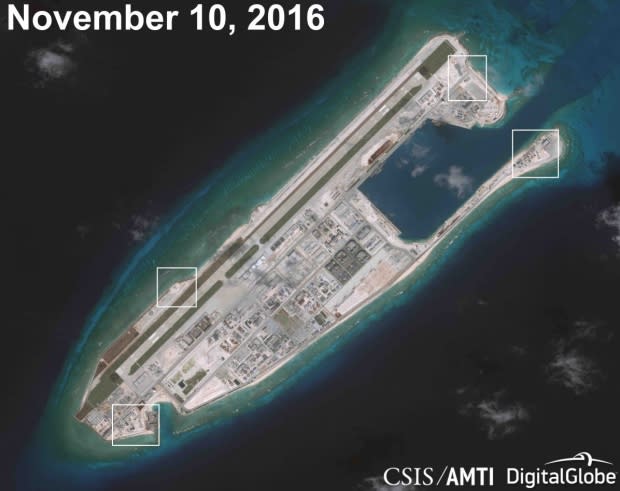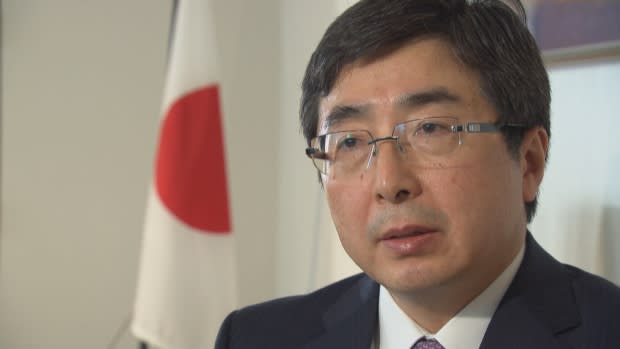As tensions rise in the Asia-Pacific, Japan's PM is calling on Canada for help
In the military, they call it "painting a target." And it apparently came as a shock to the crew of a lumbering Japanese patrol plane last December when a South Korean warship locked onto them with its fire control radar.
The incident, which took place over an empty stretch of ocean southwest of the Korean Peninsula, sparked a diplomatic furor between Tokyo and Seoul.
The South Korean military accused the Japanese of swooping low over their destroyer as it was in the process of aiding a disabled North Korean fishing boat — an allegation Japan's defence minister denied.
The incident was a riveting demonstration of how tempestuous relations can be in the region, even between supposed U.S. allies.
Such disputes — including the more high-profile standoff with Beijing over the construction of artificial islands in the South China Sea — have seemed remote and indecipherable to many Canadians, including government decision-makers.

Japanese Prime Minister Shinzo Abe is expected to pitch closer defence cooperation with Canada, among other things, when he visits Ottawa this weekend.
One defence expert said Abe's visit is an attempt to gauge how serious the Trudeau government is about becoming more engaged in the Asia-Pacific region.
Ottawa will be the Japanese prime minister's last stop on a world-wide tour that's taking him to France, Italy, Slovakia, Brussels and the United States.
One of the topics Abe is expected to discuss with Prime Minister Justin Trudeau is how the two countries can solidify Canada's regular participation in military exercises in the region.
Japan's ambassador to Canada, Kimihiro Ishikane, told CBC News in an interview Wednesday that there has been limited military cooperation between Canada and Japan already, "but there's a lot to be done."
Japan would like to see more exchanges of information and personnel between the two militaries. Canada's experience in international peacekeeping operations and capacity-building in the world's trouble spots is another major area where the two nations can work together, Ishikane said.
"Maybe we can cooperate in that field," he said. "Maybe we can also cooperate in the field of humanitarian assistance and disaster relief ... Maybe we can do all those kind of things step by step."

Abe also is expected to compare notes with Trudeau on the pressure-cooker exercise of dealing with the Trump administration during trade talks. Japan and the U.S. plan to open negotiations for their own deal after Washington pulled out of the 12-country Trans-Pacific Partnership in 2017.
Looking for friends in a dangerous neighbourhood
It's in the realm of defence, however, that the Japanese have begun to express a desire for a more formalized partnership.
Dave Perry, a defence expert at the Canadian Institute of Global Affairs, said the Abe government is motivated by both the unpredictable direction of Kim Jong Un's regime in North Korea and the growing willingness of China to test the boundaries of international law and diplomacy.
"We share a lot of common value systems ... in terms of human rights, support for democracy, good economic linkages," he said. "But I think we're also on the same side of some of the strategic issues in the region, where we want to promote open access, free trade and freedom of movement ... something that has been in place for the last several decades enforced by the U.S. Navy in the Pacific, which has benefited both of our countries."
The Canadian frigate HMCS Calgary and the navy's leased supply ship, MV Asterix, took part in Exercise Keen Sword last fall alongside dozens of U.S. and Japanese Defence Forces warships in the waters near Japan.
It was the first time that Canada had sent a combat ship to the biennial drill, which has evolved into a show of solidarity in the face of rising Chinese ambitions.

Perry said Japan's outreach to Canada isn't motivated exclusively by events in the South China Sea, but rather by a wider concern about Beijing's military modernization and how it has the potential to reduce freedom of navigation.
"The U.S. Navy has been really underpinned the freedom of movement for commerce in that region since the Second World War," said Perry.
"The fact that the U.S. seems to be withdrawing from the rest of the world and that we may not necessarily ... be able to rely upon the United States to guarantee freedom of movement in those areas is a concern."
Ishikane said keeping trade routes open is important to every country in the region.
"At this very moment, freedom of navigation is not very impaired," said Ishikane, who noted that piracy remains an important issue for governments in the region.
"But there are some concerns, I have to say, in the South China Sea and the East China Sea. So we need to be prepared and we need to share the idea that freedom of navigation, based upon established international law, rules and norms, is extremely important for the peace and prosperity of the region."
North Korea also remains a major source of worry, despite assurances from U.S. President Donald Trump that he is on track to reach an understanding with Pyongyang, said Perry.
"The last couple of years, I don't think, has done much to put to rest any of the concerns about North Korean involvement with missile technology and nuclear weapons," he said.


